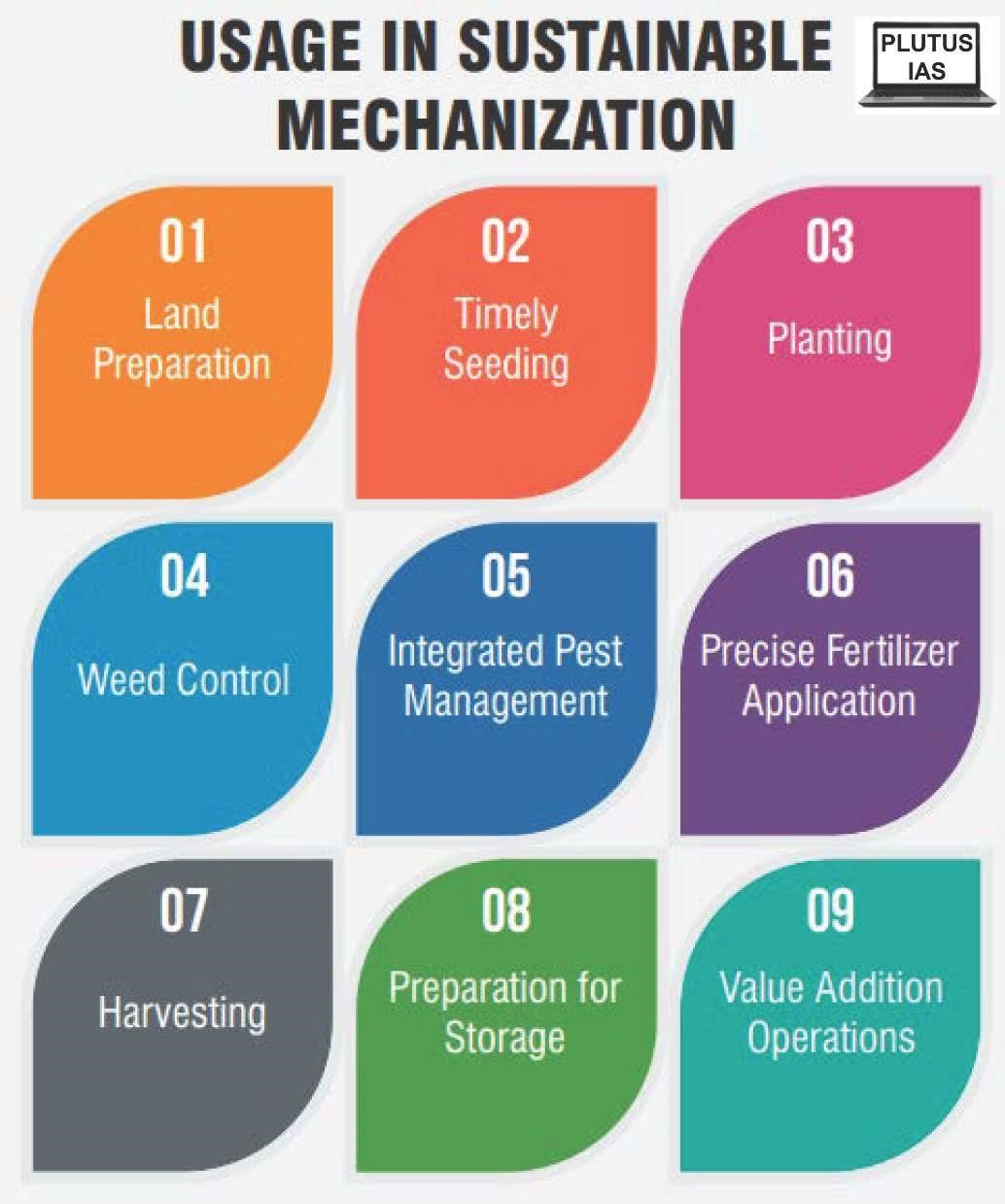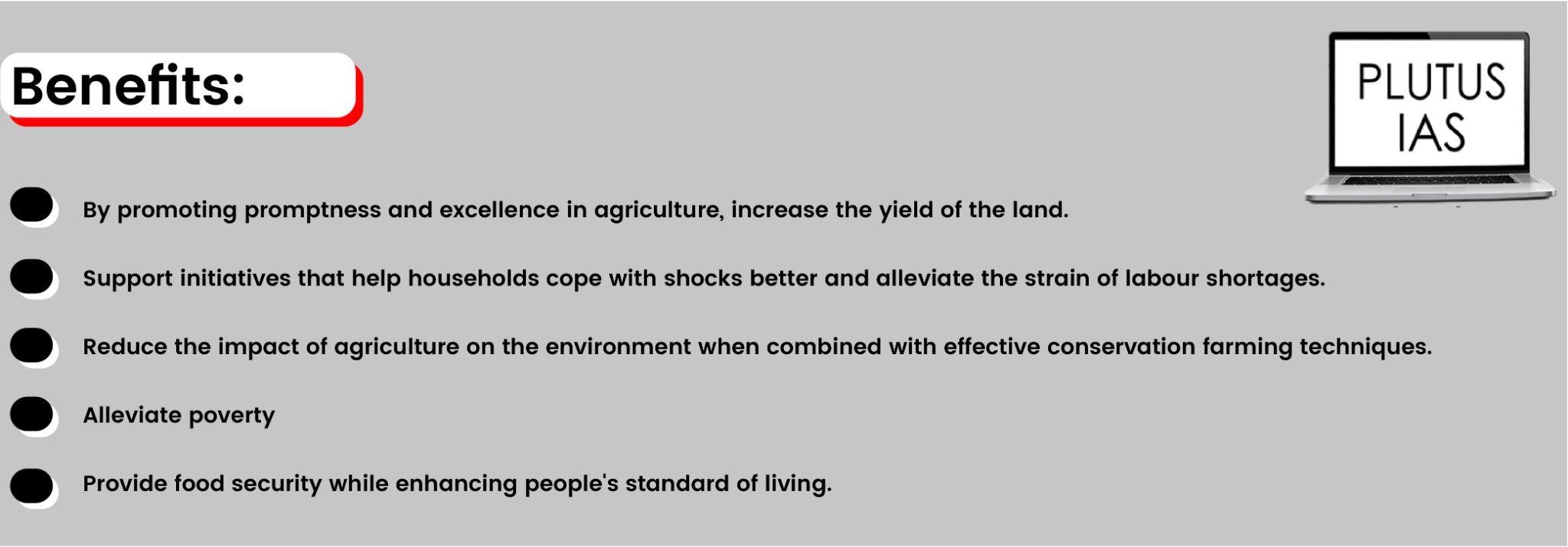06 Mar Farm Mechanization
Farm Mechanization
This article covers “Daily Current Affairs for UPSC “and the topic is about ‘Farm Mechanization’ which is in the news, it covers “Agriculture” In GS-3, and the following content has relevance for UPSC.
For Prelims: Farm Mechanization
For Mains: GS-3, Agriculture
Why in the news: The separate agriculture budget, which was presented by Chief Minister Ashok Gehlot for the second year in a row, established the agricultural technology mission, which will support farm mechanization in Rajasthan by providing subsidies for equipment purchases.
About Farm Mechanization
- Farm mechanization is the creation and application of tools that can replace labor-intensive manual labor and animal power in agricultural operations.
- Using agricultural machinery to automate agricultural tasks dramatically increases farm workers’ productivity. This practice is known as mechanized agriculture.

Farm Mechanization
How is farm mechanization carried out
- Presenting the upgraded agricultural tools for use on modest holdings and powered by bullocks.
- Utilizing power tillers, small tractors, and tractor-drawn equipment on medium-sized holdings to supplement existing sources.
- Supplementing animal power sources with heavy tractors and machinery on the remaining holdings.
Why are farmers reluctant about mechanization
- In India, there is an excess of agricultural labor.
- The country has enough supply of draft animals to do farm chores efficiently.
- The bulk of Indian farmers has small farm holdings to afford using tractors on their fields.
- There is a lack of technical expertise among the populace.
- Tractors and tractor-drawn equipment cannot be used efficiently due to a lack of an adequate farm road system.
- The yield cannot be increased with the use of mechanical power.
- The cost of production will not be reduced by mechanization.
- Not all aspects of farm operations can be automated.
- A significant portion of its working force. will get displaced from agriculture.
Why is it required
According to the Economic Survey, farm mechanization and crop productivity are directly correlated for the following reasons:
- Farm mechanization minimizes labor and time costs.
- It minimizes drudgery.
- Reduces production costs over time.
- Cuts down post-harvest losses.
- Increases crop production and farm revenue.
According to World Bank projections, half of India’s population will be urban by 2050. It is estimated that the percentage of agricultural workers in the total workforce would drop to 25.7% by 2050 from 58.2% in 2001. Thus, there is a need to enhance the level of farm mechanization in the country.

Agriculture Mechanisation
Farm Mechanization in India
- The percentage of mechanized farms in India is between 40 and 45 percent, with the northeastern states needing very little automation compared to states like Uttar Pradesh, Haryana, and Punjab.
- Compared to nations like the US (95%), Brazil (75%), and China (57%), this level of farm mechanization is still modest.
Sub-Mission on Agricultural Mechanization
Objectives
- Expanding the use of farm mechanization to small and marginal farmers as well as to areas where farm electricity is scarce.
- Promoting “Custom Hiring Centers” to mitigate the unfavorable scale economics caused by small landholdings and high individual ownership costs.
- Establishing centers for high-tech and expensive agriculture equipment.
- Awareness through demonstration.
- Capacity building activities.
Components
- Promoting and Strengthening farm mechanization through Training, Testing, and Demonstrations: This initiative aims to ensure performance testing of agricultural machinery and equipment, capacity building of farmers and end users, and the promotion of farm mechanization through demonstrations.
- Post-Harvest Technology and Management (PHTM) Demonstration, Training, and Distribution: PHTM aims to popularise technology through demonstrations, capacity building of farmers and end users, low-cost scientific storage/transport, and the management of crop byproducts. Provide financial support for setting up PHT units.
- Financial Assistance for Procurement of Agriculture Machinery and Equipment: Encourages the purchase of different agricultural gear and equipment by aid standards.
- Establish Farm Machinery Banks for Custom Hiring: Establishes Farm Machinery Banks with adequate financial support for the right regions and crops.
- Establish Hi-Tech, High Productive Equipment Hub for Custom Hiring: Establishes high-tech machinery hubs for high-value crops like sugarcane, cotton, etc., with the help of financial aid.
- Promotion of Farm Mechanization in Selected Villages: Provide financial support to establish Farm Machinery Banks in designated villages and to advance applicable technology.
- Financial Assistance for Promotion of Mechanized Operations/hectare Carried out Through Custom Hiring Centres: Financial support is given on a per-hectare basis to those who hire machinery and equipment from specialized hiring facilities in low-mechanized areas.
- Promotion of Farm Machinery and Equipment in the North-Eastern Region: Extends financial assistance in high-potential but low-mechanized states of the northeast.
Additional Information
Sustainable Agriculture Mechanisation
- Sustainable agricultural mechanization covers all farming and processing technologies, from simple and basic hand tools to more sophisticated and motorized equipment.
- Sustainable farm mechanization adopts Conservation Agriculture principles and the “Save and Grow” paradigm to enable agriculture to be both productive and profitable for farmers while at the same time contributing to conserving resources and ecosystem services.
- It eases and reduces hard labor, relieves labor shortages, improves productivity and timeliness of agricultural operations, improves the efficient use of resources, enhances market access, and contributes to mitigating climate-related hazards.
- Sustainable mechanization considers technological, economic, social, environmental, and cultural aspects when contributing to the sustainable development of the food and agricultural sector.
- Sustainable agricultural Mechanization supports the development of food supply chains through improved agricultural practices for increased production and enhanced food security.
Source:
Daily Current Affairs for UPSC
Current Affairs play a significant role in the UPSC exam preparation. The topic described provides broad information on Farm mechanization. It also talks about how Farm Mechanization contributes the Indian Agriculture and Economy. So get such kinds of the best daily current affairs topic for the UPSC examination related to Indian Agriculture and Economy. Also, read the weekly and monthly current affairs for IAS exam preparation.
Download the PDF now:




No Comments